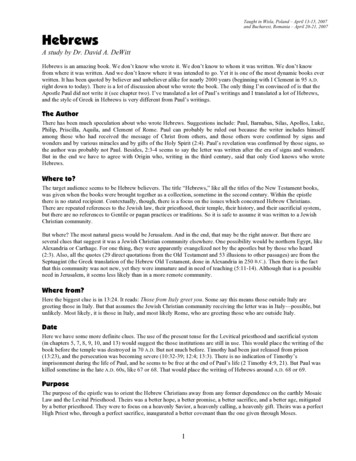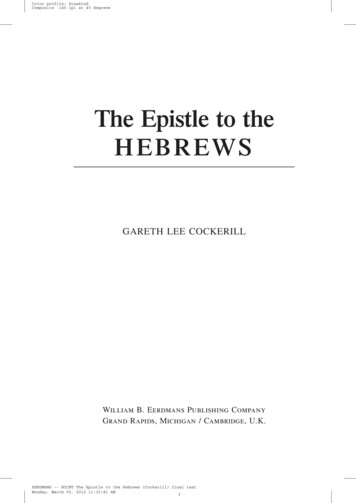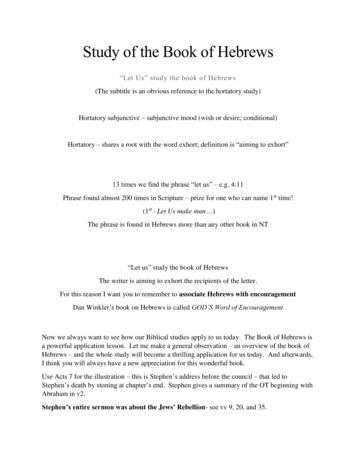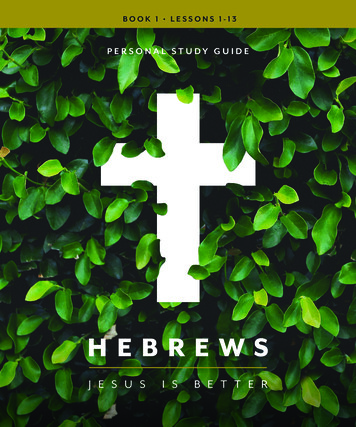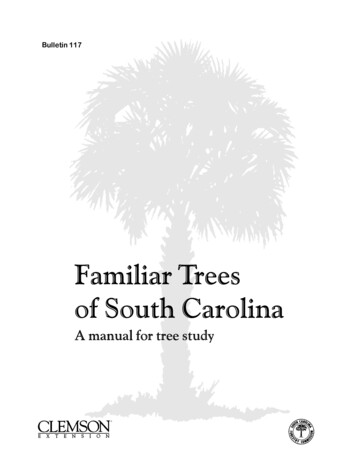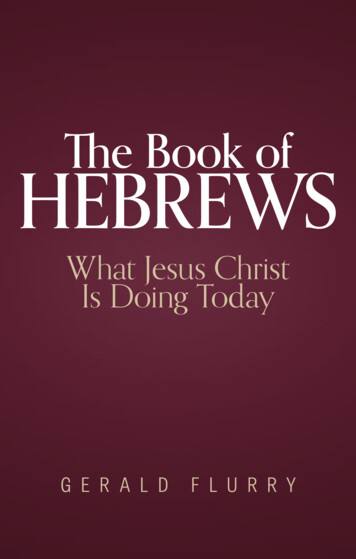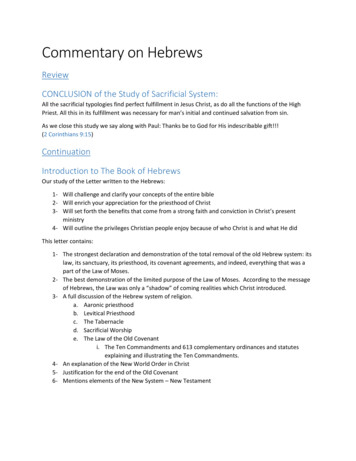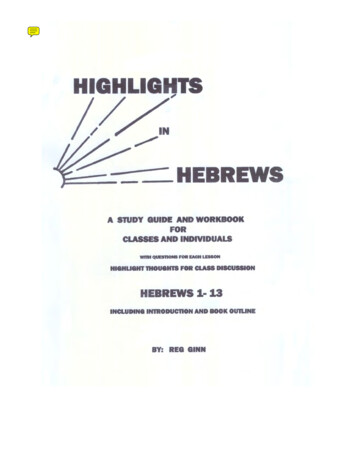
Transcription
HIGHLIGHTSINHEBREWSA WORKBOOK FOR CLASSES AND INDIVIDUALSHebrews 1-13Fifteen LessonsClass Questions and Topics for DiscussionBy: Reg Ginn
About Highlights in Hebrews-- for Teachers and StudentsThis study of Hebrews is not a commentary, nor is it intended to be. Neither is it a scholarlywork to unearth new meanings from an old epistle. Instead, it is simply a book designed forinterested students to use in seeking an uncomplicated but sound understanding of the more apparent lessons to be learned from this marvelous New Testament letter.While Highlights in Hebrews will not serve as a commentary from which to extract the moreobscure and/or language-related expositions of the text, an effort has been made in the writtendiscussion to give some attention to meanings and applications of most verses. It is hoped thatthe student will have at least a basic understanding of the book’s message when his/her study ofthese lessons has been completed.An outline format has been followed in the lessons. This should foster clarity and the completeness of each textual investigation of the passages studied. To conserve space, the Bible textof Hebrews is not included in the study book. The student should have his/her Bible open as eachlesson is prepared. References are from the New King James Version, unless otherwise indicated.The study is divided in each lesson according to the topic(s) treated by “the writer” [occasionally referred to as “Paul (?)”]. This arrangement should assist in the comprehension of theoverall message of Hebrews, its various sub-parts, and the transitions made from one part toanother. Each section under investigation is further divided into numbered “points” to assist inunderstanding a particular section. Verse citations from the Bible text follow the “points” that arerelated to those particular verses.Study questions follow each lesson. Questions are designed to emphasize the most significantideas in the text. Verse citations are given to assist in lesson preparation. Questions may be usedfor “homework” assignments, for class discussion, or both.“Highlights in Hebrews” is a collection of ideas at the end of each lesson. These thoughtsare closely related to the text, but are intended more for the purpose of practical application thanfor textual exposition. The thoughts suggested can be used as a “springboard” for class discussion that might “bring home” to students certain personal meanings of things taught in the epistle.This, of course, is the ultimate goal of Bible study.Several addenda are inserted at various places in the book. These may be used for additionalstudy related to a particular lesson or to the study as a whole at the discretion of the teacher orstudents. The same is true of several “preliminary investigations” within the lessons.May the study of these lessons help in some way to increase your knowledge and appreciation ofGod’s word. May study always draw us nearer to the God from whom all knowledge comes.--Reg Ginn
HIGHLIGHTS IN HEBREWSOverviewLessonPageForeword. 1Outline of Hebrews . 2One:Introduction to Hebrews. 5Two:Christ-- the Better Angel . 8(Hebrews 1:1- 2:4)Three:Christ-- the Better Liberator . 15(Hebrews 2:5-18)Four:Christ-- the Better Apostle . 20(Hebrews 3:1-19)Five:Christ-- the Better Rest-Giver . 26(Hebrews 4:1-13)Six:Christ-- the Better High Priest . 32(Hebrews 4:14- 5:11; 6:13-20)Seven:Christ-- the Better Destination . 41(Hebrews 5:12- 6:12)Eight:Christ-- the Better Warranty . 48(Hebrews 7:1-28)Nine:Christ-- Priest of a Better Covenant . 57(Hebrews 8:1-13)Ten:Christ and the Better Sanctuary. 66(Hebrews 9:1-11)Eleven:Christ-- the Better Sacrifice . 72(Hebrews 9:12- 10:18)Twelve:Christ and the Better People . 81(Hebrews 10:19-39)Thirteen: Christ and the Better Faith . 87(Hebrews 11:1-40)Fourteen: Christ-- the Better Finisher . 95(Hebrews 12:1-29)Fifteen:Christ-- the Better Altar . 104(Hebrews 13:1-25)(Continued on next page)
OVERVIEW (Continued)ADDENDAPAGEAddendum 1: Bible Angels.13Addendum 2: Moses and Jesus Christ.24Addendum 3: The Jewish Sabbath and Rest in Caanan.30Addendum 4: Jewish Succession to the High Priesthood.38Addendum 5: Pictures in Hebrews.103Addendum 6: Contrasts and Choices in Hebrews. 110Scripture quotations/references in this study are from the NKJV unless otherwisenoted. This version should be used by the student if possible.
Foreword to Highlights in HebrewsHebrews is at once both simple and profound. Its central message is not at all difficult to understand: God now guides men to salvation through His Son, Jesus Christ. Jesus and His gospelhave replaced all other systems and all other personnel used previously by God in directing thereligious conduct of the nations.The message of the book is directed primarily to certain Hebrew converts who seemed to be discouraged enough about their “new religion” to consider a return to things viewed as attractive inthe Law of Moses. The author seeks to persuade them to rethink their position and to renew theirloyalty to a “better way.”The “milk of the word” could be easily digested by all but the dullest of minds. The “meat,” however, was another matter. It might prove less digestible to readers who were unwilling to giveserious consideration to the rather intricate argumentation and reasoning of the author. The bookis filled with his comparisons and contrasts, both express and implied; historical references; citations from Old Testament scripture; and logical conclusions based on the analysis and synthesis offacts familiar to the general Jewish population. The writer’s challenge to his immature andunstable brethren was to “grow up” and to exercise their [religious] senses to make good decisions about their [religious] future.The same challenge faces us as we study Hebrews today. While most of us have different nationaland spiritual backgrounds than the original recipients of the letter, our knowledge of Jewishhistory and religion in the Old Testament makes it possible for us to comprehend, with somemental effort, the argumentation used and the conclusions reached in the book.Furthermore, students of Hebrews are able to glean numerous worthwhile lessons for their ownpractical application to the Christian life in the Lord’s church. Within a different context, much ofwhat first-century Hebrew Christians needed is still what we need today if we are to succeed inremaining stedfast in our faith. The book should be read to gain an insight into the Mosaic Lawthat probably is unavailable elsewhere. But more than that, Hebrews provides us with a “motherlode”of rich spiritual treasure that can ground us further in the present truth and inspire us topursue excellence in our service to God as never before. To that end, ”leaving the elementaryprinciples of Christ, let us go on to perfection.” (Hebrews 6:1).--Reg Ginn(1)
HIGHLIGHTS IN HEBREWSOUTLINE OF ***********************************Outline of ***********************************HEBREWS: ‘In Pursuit of Perfection’I. The PERFECT PERSON (Hebrews 1:1-4:13):(Who Jesus Christ IS and why He is capable of leading us to spiritual perfection)A. God’s new Spokesman. 1:1-3B. Perfection of the new Spokesman. 1:4-4:131. Superior to angels as spokesmen. 1:4-2:18a. The nature of angels.b. Angels as messengers--examples.c. Angels are inferior messengers when compared to Christ:(1) In name (nature). 1:4,5(2) In position (worship). 1:6-14(a) Implication for our obedience. 2:1-4(3) In redemption. 2:5-18(a) His destiny as Redeemer. 2:5-8(b) His humanity as Redeemer (suffering). 2:9-13(c) His victory as Redeemer (over Satan and death). 2:14,15(d) His compassion as Redeemer (for the tempted). 2:16-182. Superior to Moses as spokesman. 3:1-4:13a. The greatness of Moses as a leader and prophet.b. Moses as a messenger-- examples.c. Moses was an inferior messenger when compared to Christ:(1) In position (authority). 3:1-6(2) In security (protection). 3:7-19(3) In assurance (prospect of reward). 4:1-10(a) Implications for our obedience. 4:11-13II. The PERFECT PERFORMANCE (Hebrews 4:14-10:39):(WHAT Jesus Christ DOES for us as we strive toward spiritual perfection)A. On the part of CHRIST. 4:14-10:181. Perfection of His PRIESTHOOD. 4:14-8:6a. A sympathetic priesthood. 4:14-5:9b. An authoritative priesthood. 5:10,11(1) (Digression): implications of His sympathy. 5:12-6:12(2) Priestly authority (resumed). 6:13-20a(2)
HIGHLIGHTS IN HEBREWSOUTLINE OF ***********************************c. An unrestricted priesthood (like Melchizedek). 6:20b-7:21(1) Not limited by geneology. 7:1-19(2) Not limited by mortality. 7:20-25(3) Not limited by human weakness. 7:26-28(4) Summary/preview of Christ’s priesthood:(a) Authority (8:1); (b) Tabernacle (8:2); (c) Covenant (8:4,6); (d) Sacrifices(8:3).2. Perfection of His COVENANT. 8:7-13a. Imperfection of the first covenant. 8:7-8ab. Promise of a new and better covenant. 8:8b-12c. Replacement of the Old with the New. 8:133. Perfection of His SANCTUARY. 9:1-l1a. The earthly sanctuary described. 9:1-5b. Functions of the earthly sanctuary. 9:6-10c. A better sanctuary now enjoyed. 9:114. Perfection of His SACRIFICE. 9:12- 10:18a. A personal sacrifice. 9:12-15b. A purifying sacrifice. 9:16-24c. A permanent sacrifice. 9:25-28d. A perfecting sacrifice. 10:1-18B. On the part of CHRISTIANS. 10:19-391. Let us draw near. 10:19-222. Let us hold fast. 10:23-39a. By considering one another. 10:24,25b. By avoiding willful sins. 10:26-31e. By remembering our investment. 10:32-35d. By patiently enduring. 10:36-39III. The PERFECT PROSPECT (Hebrews 11:1-13:17)The possibilities available to the seeker of spiritual perfection)A. The reward of faith. 11:1-401. The reality of faith to the believer. 11:12. The reward of faith then: “a good testimony.” 11:2, 39a. Examples from the elders. 11:3-383. The reward of faith now: perfection in Christ. 11:39,40(3)
HIGHLIGHTS IN HEBREWSOUTLINE OF ***********************************B. The demands of faith. 12:1-71. Persistent obedience. 12:1,22. Endurance of sinners’ hostility. 12:3,43. Acceptance of God’s chastisement. 12:5-114. Renewal of spiritual strength. 12:12,135. Pursuit of peace with God and man. 12:14-17C. The comfort of faith. 12:18-291. The uneasiness of Old Testament service. 12:18-212. The easiness of Christian service. 12:22-243. The relationship between comfort and responsibility. 12:25-29D. Other requirements of our prospect. 13:1-61. Kind treatment of others. 13:1-62. Respect for gospel teaching. 13:7-133. Praise and thanksgiving. 13:14-164. Obedience to elders. 13:17IV. Final Thoughts and Admonitions (Hebrews 13:18-25)A. Request for the prayers of others. 13:18,19B. Prayer for the perfection of saints. 13:20,2 1C. Challenge to accept the encouragement of the gospel. 13:22-25(4)
HIGHLIGHTS IN HEBREWS--Lesson *****************************HEBREWS:‘IN PURSUIT OF PERFECTION’1. The study of any Bible book will seek to answer these questions:a. Who wrote it? This information allows us to compare/contrast the content with that ofbooks by same author or with that of books by different authors.b. To whom was it written? The personal and immediate circumstances in which therecipients were engaged may have a bearing on the terminology, examples, argumentation,etc., of the book.c. Why was it written? (What was its purpose?) This most important factor may determinethe approach taken, the tone used, and the content included in the book.d. When was it written? Relation of the book to the historical context may give insight intothe particular appropriateness or urgency of the content dealt with in the book.e. From where was it written? The author’s personal surroundings sometimes reflect addedmeaning to certain portions or statements contained in the book.2. Can you give examples of how these factors are reflected in one or more books of the N. T.?3. Some of these questions about Hebrews cannot be answered with any certainty; others can beaddressed more certainly.4. Who wrote Hebrews?a. There have been many answers suggested: Clement of Rome (an early church leader);Barnabas; Silas; Mark; Apollos, and others. Many (if not most) scholars have agreed forvarious reasons that Paul the apostle is most likely the author.b. The case for Paul’s authorship of Hebrews:(1) Many of the “church fathers” (early leaders) attributed the book to Paul. It is thoughtthat they had an opportunity to know the facts better than most.(2) The internal evidence of Paul’s authorship:(a) The style of writing.[1] Paul’s habit of digressing from his main thought to another and back to hisfirst topic is seen in Hebrews. (See Romans 2:12-16; 5:12-18 and Hebrews1:4,2:1; 5:10,7:1).(5)
HIGHLIGHTS IN HEBREWS-- Lesson ****************************************[2] Also, Paul’s use of similar analogies such as “runners” and “fighters”occurs inHebrews as well as in other letters (See Hebrews 12:1,2; Galatians 2:2, 5:7;and 1Cor. 9:24-26-- Hebrews 10:32; 1Timothy 6:12).(b) The author’s friendship with Timothy.[1] Timothy was a close companion of Paul for a number of years (Acts 16:3).[2] Timothy was with Paul in prison and was included in the salutations of the“prison epistles” (See Philippians, Colossians, and Philemon).[3] Paul planned to dispatch Timothy to Philippi when he knew “how it goes withme” (Philippians 2:19-24) and to come with him “shortly” if he could.[4] Hebrews records that Timothy “has been set free.” Paul hoped soon to “berestored” to the brethren in the company of Timothy (Hebrews 13:19,23).[5] Paul greeted the Hebrews “from Italy” [Rome?] (Hebrews 13:24).(c) The Hebrew writer used the word “mediator,”employed only by Paul elsewhere(See Hebrews 8:6; 9:15; 12:24 and Gal. 3:19,20; 1Timothy 2:5).c. A negative argument against Paul”s authorship: Why did Paul not identify himself since healways did so in other letters? A possible answer: He had good reason not to, since he hadalready raised resentment among both converted and unconverted Jews when heabandoned a strong position in support of the Law. Paul wished to persuade the Jews toreceive the message of Hebrews without prejudice against him personally and sodeliberately omitted his name from the book’s introduction.5. To whom was the book written?a. No salutation is affixed to the letter. It begins simply, “God, who at various times.”b. “To the Hebrews” was attached at an early date after its writing.c. It is generally agreed that it was addressed to Jewish Christians in Palestine (perhaps inthe Jerusalem church) who were discouraged about the Christian life.d. Internal evidence suggests strongly that Jewish Christians received the letter:(1) It assumed that the recipients were familiar with Jewish history, e.g.:(a) Hebrews 3:5-- Moses as a faithful servant for Israel;(b) Hebrews 4:8-- Joshua as the leader of Israel into Caanan;(c) Hebrews 11:4-40-- Heroes of the Jewish faith are cited;(d) Hebrews 12::l8ff-- Details of the giving of the Law to IsraeL(2) It assumed familiarity with the Jewish Law, e.g.:(a) Hebrews 4:4-- The reason for Jews keeping the sabbath day;(b) Hebrews 5:1-4-- Function of the Jewish high priest;(c) Hebrews 7:14-- Restrictions on qualifying for the priesthood;(d) Hebrews 10:28-- Punishment by stoning under the Law.(3) It assumed familiarity with Jewish ceremonial activities, e.g.:(6)
HIGHLIGHTS IN HEBREWS-- Lesson ****************************************(a) Hebrews 8:5; 9:1-6-- The appointments of the tabernacle for Jewish worship;(b) Hebrews 10:1-4-- Repetition of sacrificial offerings;(c) Hebrews 10:19-22-- Rituals of cleansing in the tabernacle worship.5. Why was the book written?a. To show the unquestioned superiority of the New Covenant over the Old. The NEWCOVENANT had:(1) A better spokesman and lawgiver (1:4); (7) Better sacrifices (9:23);(2) A better salvation (6:9);(8) A better possession (10:34);(3) A better priesthood (7:7);(9) A better country (11:16);(4) A better hope (7:19);(10) A better resurrection (11:35);(5) A better covenant (7:22; 8:6);(11) Better blood (12:24).(6) Better promises (8:6; 11:40)b. To encourage wavering Jewish Christians to be faithful to Christ:(1) Hebrews 4:11— “.be diligent.”(2) Hebrews 6:11.- “.show.hope until the end.”(3) Hebrews 9:28-- “.eagerly wait for Him .for salvation.”(4) Hebrews 10:23-- “.hold fäst.our hope.”6. When was it written?a. The temple service seems to have been in place at the time of writing (8:4; 10:11).b. The temple was destroyed by the Romans in 70 A.D. Hebrews must have been writtenprior to that date (See 10:24,25 [“the day”]?), possibly between A.D. 63 and A.D. 65.7. From where was it written?a. It probably was sent from a Roman prison prior to Paul’s release (13:19,24).(7)
HIGHLIGHTS IN HEBREWS-- Lesson 2Text-- Hebrews ***********************************Christ-- the Better AngelIntroductory Statement: To Jewish Christians, many of whom were discouraged and strugglingwith their faith in the New Covenant, the writer of Hebrews sent this central message: “Don’tgive up on Jesus and His gospel!” Some Jews were jealous for the Law because its deliveryfrom God had utilized angels in some capacity (See Galatians 3:19; Acts 7:53). It was alsoassociated with Moses, the great leader who had administered it among the nation. Theauthor’s task is clear: remind wavering saints that they enjoy “better” things under Jesus’ lawthat were never available under the Law of Moses, and convince them of the folly ofchoosing “worse” rather than “better.”Verses 1:1, 2a: Announcing God’s “New Angel” (Messenger).1. No other N.T. book begins with such directness and authority: God! “Going to the top”should arrest the attention of readers [Jews particularly]. Note this difference from theopenings of other books. Announcing a book’s content, author, subject, or scope [as inother books] might or might not impress. But-- God-- Surely, whatever He has to say isworth listening to! vs. 12. God’s initial message is His most vital message: He has changed His spokesman! He isnow “broadcasting” on a different frequency, and we must now change stations if we areto receive the message He intends for us.3. God’s messages had previously been sent: (I) at different times [during both Patriarchaland Mosaic dispensations]; (2) in different ways [e.g., in “visions of God” (Ezekiel 1,2ff);in a “still, small voice” (lKings 19:1211); “face to face” (Exodus 33:11), by Urim andThummim (1 Samuel 28:6), etc.); and (3) to different “prophets” but NOW [in this finaltime-slot (“last days”)] He speaks only through ONE spokesman-- His Son! Let all othervoices be still! Listen to God’s “New Angel” [Messenger]! vs. 1, 2aVerses 1:2b-3: Qualifications of this “New Angel” (Messenger).1. He is the appointed “heir”of all things-- “heirs” are the “closest relatives.” Jesus is the“Son” of God in a way that no other can be (See John 1:14).(a) Christians are “heirs,” but not of “all things” associated with the nature, power,authority, and judgment of the Father. Only Jesus Christ holds that distinction (SeelCorinthians 15:27,28).2. He is the “Maker of the worlds” (See Genesis 1:1,26; Colossians 1:16). The “Potter” hasthe right to shape the “clay” (See Jeremiah 18). vs. 2b(8)
HIGHLIGHTS IN HEBREWS-- Lesson 2“Christ-- the Better ************************************3. He is of the same Nature as the Father. He possesses every divine attribute necessary todirect men to eternal life (See Colossians 2:9; 1Timothy 6:15,16). vs. 3a4. He upholds everything by the power of His word. The same word (His will) that can oversee man’s total physical existence through natural law can also successfully guide man’sspiritual quest for salvation through religious law (See Romans 8:28-30). vs. 3b5. He has earned the right by His great sacrifice to speak for God (See Philippians 2:5-11).Verses 1:4-14: The “New Angel” is Better Than the “Old Angels” (Messengers).1. His name (Greek- “onoma”: “all a name implies” [Vine’s Expository Dictionary of N.T.Words]) is “so much better” than that of “angels” (spiritual beings who delivered revelations to men-- See Galatians 3:19; Acts 7:53; also, Addendum, “Bible Angels”). vs. 42. His “name” was conferred by the Father because of the special relationship between them.(a) This relationship was foretold by O.T. prophets-- Psalm 2:7 and 2Samuel 7:14. vs. 5(b). No angel (not even Michael or Gabriel) shared such a relationship with God.3. The differences between the role of Christ and the role of angels. vs. 6-14a. Differences should have been obvious to readers of the Psalms. Quotations from fivePsalms emphasize the great contrast between the Son of God and the angels of God.b. The angels occupy a secondary role in God’s plan of salvation.(1) Psalm 97:7-- They are worshipers rather than worshiped. vs. 6b(a) Angels by nature are unworthy of worship. (See Revelation 22:8,9; Colossians2:18).(2) Psalm 104:4-- They are expediters rather than initiators. vs. 7(a) They are capable of executing God’s work speedily and irresistibly [“a flameof fire”] (See Isaiah 66:15).(3) Psalm 110:1-- Their ministry focuses on saints this side of eternity. vs. 14(a) They dispense God’s Providence to assist saints in overcoming obstacles totheir salvation [including death] (See 1Corinthians 15:24-26).c. The Son enjoys the primary role in God’s plan of salvation.(1) Psalm 97:7-- He is worthy of worship even by angels. vs. 6b(a) Only God is the object of worship (See Acts 10:25,26; Revelation 22:9).(b) The resurrection [“again. into the world”] declared His worthiness. vs. 6a(2) Psalm 45:6,7-- His service to saints is performed here and hereafter. vs. 8a(a) His power to help us emanates from His throne and His scepter. vs. 8(9)
HIGHLIGHTS IN HEBREWS-- Lesson 2“Christ-- the Better ************************************(3) Psalm 102:25-27-- His eternal plan for man’s salvation is absolutely unchangeable. vs. 10-12(a) His physical creation has changed and will change again (See Genesis 1:1,2;2Peter 3:10,12). vs. 10- 12a(b) Only His unchangeable self assures an unchangeable purpose in Christ and anunchangeable hope in man (See Hebrews 13:8). vs. 12b(4) Psalm 45:6,7-- His reign cannot be flawed by sin and weakness. vs. 8b,9(a) Christ had demonstrated His love for righteousness and His hatred for sin (See1Peter 2:21-23). vs. 9a(b) Some angels had fallen to temptation and sin (See 2Peter 2:4; Jude 6).(c) The Father endorsed His worthiness to reign and to redeem. vs. 9b(5) Psalm 110:1-- His complete victory over every spiritual enemy is certain. vs. 13b(a) Humanity’s trust cannot be misplaced in divinity (See 2Timothy 1:12)!vs. 2:1-4: Truth and Consequences.1. We must (by choice, not compulsion) give more attention to what God’s “New Angel”has said to us than to any previous pronouncement by an “Old Angel” (messenger). vs. 12. God has required obedience to every word of lesser messengers in past ages. vs. 2a. No one escaped punishment for disobedience: e.g., Lot’s wife (Genesis 19:17,26);Zecharias (Luke 1:8-20).b. The Law of Moses was “appointed [administered] through angels” (Galatians 3:19).(1) Punishment always followed disobedience:(a) For individuals-- one who gathered sticks on the sabbath (Numbers 15:32-36).(b) For the Jewish nation-- captivity resulted from rebellion (See Jeremiah 44:23).(2) God’s retribution was “just” [fair]. Ample warning preceded each test of faith.vs.23. God requires obedience to every word of His greatest messenger in this present age. vs. 3a. Christ gave up heaven to deliver God’s message to earth (See Hebrews 10:9).b. Christ’s apostles “confirmed” the message of the “Better Angel” (See 1John 1:1-5).c. God also “confirmed” the message by signs. wonders, miracles, and spiritual gifts (SeeMark 16:15-20). vs. 4******HIGHLIGHTS IN HEBREWS-- Lesson Two******1. God has changed His Spokesman for the New Covenant. He speaks now only throughHis Son and not through “modern” prophets or through angels. Nor does He reveal Hiswill by means of dreams, apparitions, or any such things.(10)
HIGHLIGHTS IN HEBREWS-- Lesson 2“Christ-- the Better ***********************************2. Jesus Christ, God’s “Better Angel” (Messenger), is totally qualified to serve as the NewSpokesman for the Father. He does not need someone else (e.g., Joseph Smith, Mary BakerEddy, Ellen White, Judge Rutherford, or Muhammad) to speak for Him or to improve on Hismessage.3. There is little question that men would listen carefully today to some revelation that camefrom an angelic being. How strange that these same men will pay no heed to Jesus-- amessenger from God who is far more important than any angel.4. Three witnesses have testified about the importance and urgency of God’s latest and lastmessage from heaven:a. Jesus Christ, who first delivered the message;b. The apostles, who represented the message to others as being true and complete;c. God, who confirmed the truth of Jesus’ gospel by signs and miracles.5. The inevitable conclusion: To refuse to accept God’s last and greatest messenger is to rejectevery messenger God has sent and to deny the integrity of the God who sent them (SeeMatthew 10:40).Notes and. Comments:(11)
HIGHLIGHTS IN HEBREWS--“Christ-- the BetterAngel”LESSON TWOHebrews *******************************************Chapter 11.What three variables characterized God’s communication with men in “time past”? (vs.l)2.What certainty now prevails about God’s communication in “these last days”? (vs. 2)3.List the qualifications of Christ as God’s “new spokesman.” (vs. 2-4)4.What is the basic meaning of “angel”? (Consult a dictionary if necessary) Why can Christ becalled a “better angel”?5.What is the fundamental reason that Christ is a “better angel” than “the angels”? What does“a more excellent name” mean? (vs.4)6.What is the first speciflc difference given between Christ and angels? (vs. 5-6a)7.Give the next difference as cited from O. T. scriptures. (vs. 6,7)8.What qualities “entitled” Christ to His eternal throne? (vs. 8,9)9.Still another feature of Christ’s nature assured Him of everlasting authority over all creation.What is it? ( vs. 10-12)10. The function of angels is focused on what group of people? (vs. 14)Chapter 211. What two conclusions are stated about heeding God’s messengers? (2:1-4)12. What consequence occurs when we ignore these conclusions? (2:1-4)(12)
HIGHLIGHTS IN HEBREWS-- ADDENDUMBIBLE *********************************************Bible Angels(Messengers)JESUS CHRIST: The “Angel [Messenger] of the Lord”1. He spoke to Hagar about her descendants (Genesis 16:10-12). She acknowledged HisPerson (verse 13).2. He followed [“one going in the same way”--Vine] the Jews in the wilderness(1Corinthians 10:4).3. He prepared the way for the occupation of Caanan (Exodus 23 :20-33).4. He was called “My Presence” (Exodus 32:34; 33:14; Isaiah 63:9).5. He spoke to Moses from a burning bush (Exodus 3:2, 4, 14; John 8:58).6. He spoke to Moses from the mercy seat about Levitical ceremonies (Numbers 7:8,9).7. He was the “messenger [angel] of the covenant” (Malachi 3:1).8. This was the role of Christ as the “Preincarnate Messiah” [numbers 1-7, above].9. He now speaks for the Father to men (Hebrews 1:3; John 12: 49,50; John 1: 1,14).ANGELS (Heavenly Beings): “Angels [Messengers] of the Lord”1. Who are they?a. Spiritual beings (Matthew 22:3).b. Created beings (Colossians 1:16).c. Existed as “sons” before the world created (Job 38:4-7); not spirits of dead people.d. Occupy different ranks, roles (1 Thessaloriians 4:16; Jude 9; Daniel 8:16; Luke 1:19,26).e. Positioned [ranked] above humans (Psalm 8:5).f. Possess: intellect (1Peter 1:12); will (Galatians 1:8, 2Peter 2:4, Jude 6); and emotions[like men] (Luke 15:10).g. Some sinned long ago and rec
About Highlights in Hebrews-- for Teachers and Students This study of Hebrews is not a commentary, nor is it intended to be. Neither is it a scholarly work to unearth new meanings from an old epistle. Instead, it is simply a book designed for interested students to use in seeking
